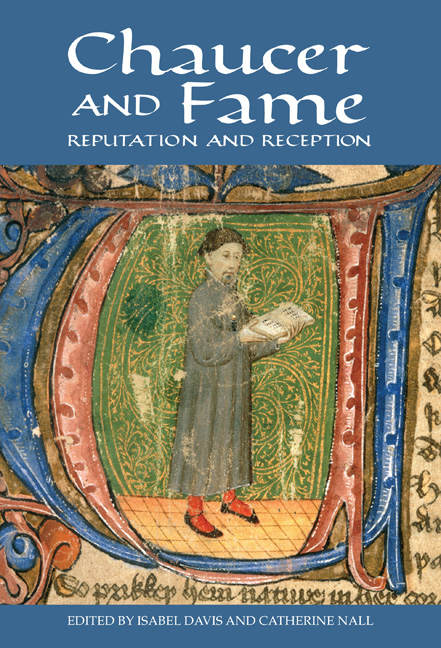Book contents
- Frontmatter
- Contents
- List of Illustrations
- List of Contributors
- Acknowledgements
- Introduction
- 1 Chaucer Joins the Schiera: The House of Fame, Italy and the Determination of Posterity
- 2 ‘I Wolde … han Hadde a Fame’: Dante, Fame and Infamy in Chaucer’s House of Fame
- 3 ‘And kis the Steppes where as thow Seest Pace’: Reconstructing the Spectral Canon in Statius and Chaucer
- 4 ‘I Nolde Sette at al that Noys a Grote’: Repudiating Infamy in Troilus and Criseyde and The House of Fame
- 5 The Early Reception of Chaucer’s The House of Fame
- 6 Fame’s Penitent: Deconstructive Chaucer Among the Lancastrians
- 7 After Deschamps: Chaucer’s French Fame
- 8 ‘Fresch Anamalit Termes’: The Contradictory Celebrity of Chaucer’s Aureation
- 9 Chaucer the Puritan
- 10 Revenant Chaucer: Early Modern Celebrity
- 11 Ancient Chaucer: Temporalities of Fame
- Bibliography
- Index
- Chaucer Studies
3 - ‘And kis the Steppes where as thow Seest Pace’: Reconstructing the Spectral Canon in Statius and Chaucer
Published online by Cambridge University Press: 21 May 2021
- Frontmatter
- Contents
- List of Illustrations
- List of Contributors
- Acknowledgements
- Introduction
- 1 Chaucer Joins the Schiera: The House of Fame, Italy and the Determination of Posterity
- 2 ‘I Wolde … han Hadde a Fame’: Dante, Fame and Infamy in Chaucer’s House of Fame
- 3 ‘And kis the Steppes where as thow Seest Pace’: Reconstructing the Spectral Canon in Statius and Chaucer
- 4 ‘I Nolde Sette at al that Noys a Grote’: Repudiating Infamy in Troilus and Criseyde and The House of Fame
- 5 The Early Reception of Chaucer’s The House of Fame
- 6 Fame’s Penitent: Deconstructive Chaucer Among the Lancastrians
- 7 After Deschamps: Chaucer’s French Fame
- 8 ‘Fresch Anamalit Termes’: The Contradictory Celebrity of Chaucer’s Aureation
- 9 Chaucer the Puritan
- 10 Revenant Chaucer: Early Modern Celebrity
- 11 Ancient Chaucer: Temporalities of Fame
- Bibliography
- Index
- Chaucer Studies
Summary
At the close of Troilus and Criseyde, Chaucer instructs his ‘litel bok’ to go forth into the world as it continues to venerate the traces of the great poets, Virgil, Ovid, Homer, Lucan and Statius, who have come before it (Troilus and Criseyde, Book 5, lines 1789-92). This moment constitutes a classic example of what David Wallace has called a ‘sixth of six topos’, a literary device that ‘bespeaks the highest poetic ambition: a desire to complete a sequence of poetic activity conjoining pagan antiquity and the Christian present’. Chaucer's tribute to these five authorities establishes him as the recipient of their literary legacy, where he becomes the sixth member of an illustrious collective. Inserting himself into this handpicked canon, Chaucer becomes its implicit culmination, thus asserting Troilus and Criseyde's claim to literary fame. Despite the self-professed reliance of his text on antiquity, however, in his actual use of the device Chaucer is drawing on far more proximate – and vernacular – literary models. His list of classical poets echoes Dante's ‘bella scola’ in the Inferno, where Virgilio introduces Dante to the shades of Homer, Horace, Ovid and Lucan, who proceed to welcome Dante as the sixth poet in their midst (Canto 4, lines 82–102). The form of Chaucer's invocation is more reminiscent still of the Filocolo, where Boccaccio addresses himself to his ‘piccolo … libretto’ [little book] and commands it to follow Virgil, Lucan, Statius, Ovid and Dante ‘siccome piccolo servitore molto … reverente’ [like a little servant most reverentially].
However, where Boccaccio had Dante as the final figure in his constructed canon, Chaucer includes no vernacular poets at all in his line-up. Instead, despite borrowing the form of his envoi from Boccaccio, Chaucer asserts his text's claim to fame by means of a purely classical literary heritage. Eliding not only Boccaccio's but also the notion of any vernacular influence on his text, Chaucer thus replicates, in miniature, his process throughout Troilus and Criseyde of borrowing heavily from his unnamed Italian source, Boccaccio's Filostrato, yet imputing the text's origins to the Latin of a certain Lollius. The name, furthermore, that Chaucer situates in the emphatic final position of his literary line-up – in the same place where Boccaccio had himself located Dante – is Statius.
- Type
- Chapter
- Information
- Chaucer and FameReputation and Reception, pp. 57 - 74Publisher: Boydell & BrewerPrint publication year: 2015
- 3
- Cited by



